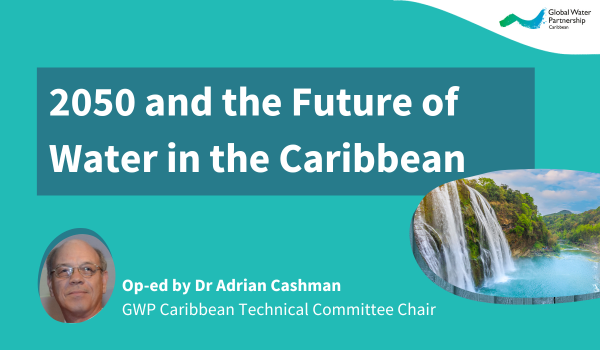Have you ever wondered what life might be like in 20- or 30-years’ time? What would the experience of waking up and going to the bathroom be like? What happens after you run the tap to clean your teeth? Or flush the toilet – would you even be flushing a toilet? These are the sorts of questions that were explored in the final chapter of the recently released Grenada National Ecosystems Assessment Report.
Three foresight scenarios | Grenada Greens | Grenada Goes | Water-secure world | About Adrian Cashman
Three foresight scenarios
By considering how these emerging trends might play out over the next 30 years, we developed three plausible but contrasting foresight scenarios: Grenada Goes, Grenada Grows, and Grenada Greens. Scenarios are a form of science fiction; plausible scenarios are based on good science but as we have not experienced the future, they are also a work of fiction. The aim of the three scenarios was to develop narratives that outlined what social, economic and environmental conditions could be like around the year 2050. Using these background conditions as a starting point, we started asking questions like; What would biodiversity and ecosystem services look like? And how did they develop in this way?
Although we may focus on particular aspects, such as water availability and quality, when developing scenarios, we need to recognise that their condition result from a web of complex interactions between the natural and human environments. Water sustains both environments and they both sustain water. So, to understand the state of water now and in the future, we need to understand the state of the natural environment, the forces shaping it, and the extent to which human interventions and exploitations have an impact. The Grenada foresight scenarios painted three very different water futures for the island. For all three scenarios we envisaged a period of complacency during the mid-2020s as more and more funding for the water sector becomes available to combat the emerging threats of climate change. This is followed by a deep and prolonged period of dry and drought conditions. These conditions provide the backdrop for changes in water resources and water services management and provision.
Grenada Greens
We hypothesised that under Grenada Greens there is less pressure on terrestrial ecosystems. Retention of intact forest and reforestation efforts, together with the adoption of sustainable agricultural and land management practices support carbon sequestration, soil formation and nutrient cycling to maintain ecosystem services. As a result, water resources are less stressed by climate change. In fact, demands on water resources have decreased through a combination of more efficient and effective water use and wastewater reuse. Technology too has made a big difference, enabling more efficient provision and regulation of water services. Overall, Grenada is better placed to meet the water challenges of the second half of the 21st century.
Grenada Goes
By contrast, under Grenada Goes the situation in general has deteriorated. Poor economic performance and rising levels of poverty have increased human pressures on the natural environment. Forests are under threat and being cleared for agriculture. Ecosystems have deteriorated, and less able to mitigate the effects of climate change. Climate change has reduced recharge and streamflows so that some streams and rivers are reduced to a trickle in the dry season. Water services have fragmented as private sector providers have moved in to fill a void. The better-off sections of society are able to insulate themselves from water shortages, relying on desalination water provided by private operators. The less well-off have no choice but to rely on the state-owned enterprise, and endure poor water quality and extended shut-offs as it struggles to finance day-to-day operations.
Water-secure world
The point about foresight scenarios is that they paint pictures of possible futures that we can shape, highlighting how different policies and programmes can make a difference, one way or another. They can invite us to think about what makes a water-secure world. It’s not just about better pipes but about people, policies and programmes, it’s about our choices that affect the environment, ecosystems and economics. In Grenada, we have used foresight scenarios to explore the potential impact of different policy decisions on biodiversity and the health of ecosystems. But there are implications for the water environment as well. Foresight scenarios are powerful communication tools that can challenge the way we think and act. We need to make more use of them.
About Adrian Cashman
Dr Adrian Cashman has over 40 years of experience in the water sector and has been working in the Caribbean for the past 16 years, first with the University of the West Indies (UWI) and more recently as an water management consultant. At UWI he led the water resources management programme in the Centre for Resource Management and Environmental Studies (CERMES. At CERMES he trained and mentored many postgraduate students who have gone on to play important roles in the water sector across the Region. Prior to moving to the Caribbean, he was a Research Fellow at the University of Sheffield’s Water Centre working on asset management. From 1982 until 1998 he worked in Namibia with the Department of Water Affairs as Director of Water Operations and also Civil Design. He has a first degree in Civil Engineering, a Masters degree in Environmental Economics and a Doctorate in Social Science.
Dr Cashman’s published works cover a diverse range of fields, and he has worked with a wide range of international and regional organisations on water and climate related matters. In 2020 he received the Caribbean Water and Wastewater Associations Gold Award for services to the Caribbean water sector.

